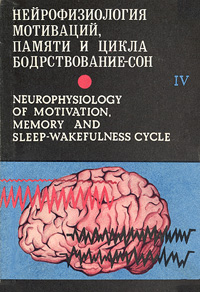
Edited by T. Oniani, Metsniereba Publishers, Tbilisi, 1985
Content | Introduction
 |
NEUROPHYSIOLOGY OF MOTIVATION, MEMORY AND SLEEP-WAKEFULNESS CYCLE IV. Edited by T. Oniani, Metsniereba Publishers, Tbilisi, 1985 Content | Introduction |
Content
Introduction
The present Volume IV of' thematic collected papers comprises experimental studies on the neurophysiology of motivation, memory and the functional significance of paradoxical sleep. Particular attention is devoted to the analysis of the role of paradoxical sleep in the organization of different stages of memory and regulation of motivational processes. Currently these problems attract keen attention of investigators studying the mechanisms of activity of the entire brain, and along with the accumulation of valuable experimental material incorrect statements are occasionally made, which may put future investigations on the wrong track. In my opinion this refers primarily to the widespread view on the specific role of the development of the hippocampal theta rhythm, reflecting as it does a high level of functioning of the septo-hippocampal system, in the consolidation of memory traces, and on the specific role of paradoxical sleep in the organization of learning and memory. In recent years, elucidation of the functional significance of the septo-hippocampal system on the one hand, and of paradoxical sleep, on the other, has been also in the focus of attention of .the research staff of the Laboratory of Neurobiology of the Sleep-Wakefulness Cycle at the I.S. Beritashvili Institute of Physiology of the Georgian Academy of Sciences. With the application of a variety of techniques and experimental designs, some supplementary data were obtained, an analysis of which allowed a critical consideration of certain deep-rooted statements, and in turn, to advance new ideas which, I belive, are more promis-sing not only from the point of view of analysis of the available material but also for the right orientation of research in future. At the same time, the hypotheses set forth here as substitutes for the old ones have on claim to infallibility. It is hoped, however, that the new hypotheses provide a better explanation of the material accumulated to date, showing more clearly the way in which future experimentation ought to be directed. Further research will doubtless introduce appreciable corrections, and our theory, too, may fail to stand the test. Such is the logic of scientific progress in general, and particularly, of the biology of the brain - a field of science in which specialists will have to traverse a long road before the first clear horizon appears.
In contrast to the previous three volumes in this series, the present collection is characterized by compactness of the considered problems, which are more or less interrelated. Thus, for example, while discussing the neurophysiological mechanisms of memory, much attention is given to the elucidation of the role of paradoxical sleep in the organization of this phenomenon, and in considering the functional significance of. paradoxical sleep, to the role of development of intrinsic needs and motivational processes that serve as stimuli for the retrieval of traces of previous experience, thereby rehabilitating memory in its long-term storage. This brings this volume close to a monograph with a limited number of main authors who take joint responsibility for possible shortcomings. Critical comments will be appreciated with gratitude.
Prof. Tengiz Oniani
1985